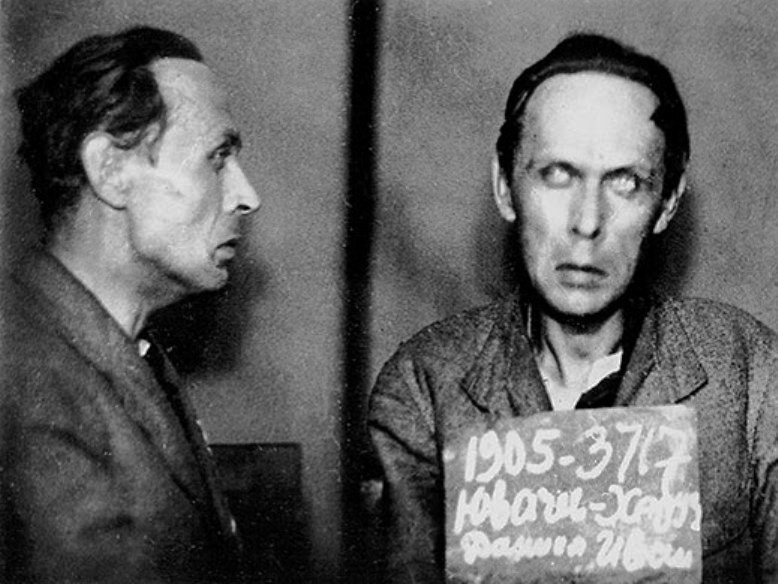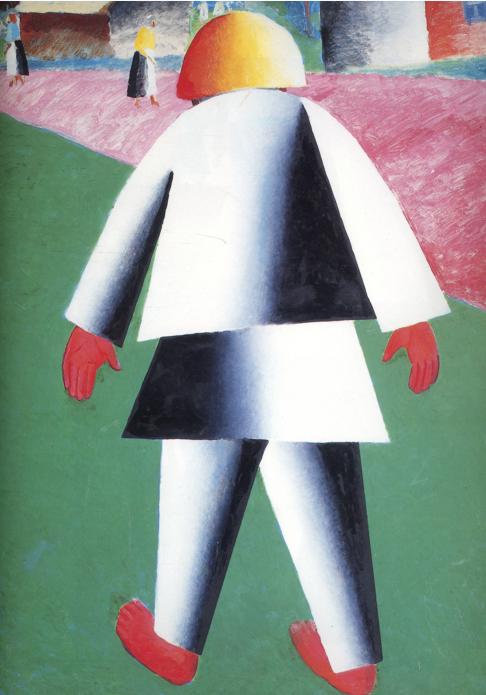|
Daniil Harms
Daniil Ivanovich Kharms (russian: Дании́л Ива́нович Хармс; – 2 February 1942) was an early Soviet-era Russian avant-gardist and absurdist poet, writer and dramatist. Early years Kharms was born as Daniil Yuvachev in St. Petersburg, into the family of Ivan Yuvachev, a member of the revolutionary group The People's Will. By the time of his son's birth, Ivan Yuvachev had already been imprisoned for his involvement in subversive acts against Tsar Alexander III and had become a philosopher. Daniil invented the pseudonym Kharms while attending Saint Peter's School. While at Saint Peter's, he learned the rudiments of both English and German, and it may have been the English words "harm" and "charm" that he incorporated into "Kharms".Frazier, Ian (7 May 2015). "A Strangely Funny Russian Genius". ''The New York Review of Books'' 62 (8): 36–38. His pseudonym might have been also influenced by his fascination with Arthur Conan Doyle's Sherlock Holmes, ... [...More Info...] [...Related Items...] OR: [Wikipedia] [Google] [Baidu] |
Saint Petersburg
Saint Petersburg ( rus, links=no, Санкт-Петербург, a=Ru-Sankt Peterburg Leningrad Petrograd Piter.ogg, r=Sankt-Peterburg, p=ˈsankt pʲɪtʲɪrˈburk), formerly known as Petrograd (1914–1924) and later Leningrad (1924–1991), is the second-largest city in Russia. It is situated on the Neva River, at the head of the Gulf of Finland on the Baltic Sea, with a population of roughly 5.4 million residents. Saint Petersburg is the fourth-most populous city in Europe after Istanbul, Moscow and London, the most populous city on the Baltic Sea, and the world's northernmost city of more than 1 million residents. As Russia's Imperial capital, and a historically strategic port, it is governed as a federal city. The city was founded by Tsar Peter the Great on 27 May 1703 on the site of a captured Swedish fortress, and was named after apostle Saint Peter. In Russia, Saint Petersburg is historically and culturally associated with t ... [...More Info...] [...Related Items...] OR: [Wikipedia] [Google] [Baidu] |
Arthur Conan Doyle
Sir Arthur Ignatius Conan Doyle (22 May 1859 – 7 July 1930) was a British writer and physician. He created the character Sherlock Holmes in 1887 for ''A Study in Scarlet'', the first of four novels and fifty-six short stories about Holmes and Dr. Watson. The Sherlock Holmes stories are milestones in the field of crime fiction. Doyle was a prolific writer; other than Holmes stories, his works include fantasy and science fiction stories about Professor Challenger and humorous stories about the Napoleonic soldier Brigadier Gerard, as well as plays, romances, poetry, non-fiction, and historical novels. One of Doyle's early short stories, " J. Habakuk Jephson's Statement" (1884), helped to popularise the mystery of the ''Mary Celeste''. Name Doyle is often referred to as "Sir Arthur Conan Doyle" or "Conan Doyle", implying that "Conan" is part of a compound surname rather than a middle name. His baptism entry in the register of St Mary's Cathedral, Edinburgh, gives "Arth ... [...More Info...] [...Related Items...] OR: [Wikipedia] [Google] [Baidu] |
Franz Kafka
Franz Kafka (3 July 1883 – 3 June 1924) was a German-speaking Bohemian novelist and short-story writer, widely regarded as one of the major figures of 20th-century literature. His work fuses elements of realism and the fantastic. It typically features isolated protagonists facing bizarre or surrealistic predicaments and incomprehensible socio-bureaucratic powers. It has been interpreted as exploring themes of alienation, existential anxiety, guilt, and absurdity. His best known works include the short story "The Metamorphosis" and novels ''The Trial'' and '' The Castle''. The term ''Kafkaesque'' has entered English to describe absurd situations, like those depicted in his writing. Kafka was born into a middle-class German-speaking Czech Jewish family in Prague, the capital of the Kingdom of Bohemia, then part of the Austro-Hungarian Empire, today the capital of the Czech Republic. He trained as a lawyer and after completing his legal education was employed full-ti ... [...More Info...] [...Related Items...] OR: [Wikipedia] [Google] [Baidu] |
Theatre Of The Absurd
The Theatre of the Absurd (french: théâtre de l'absurde ) is a post–World War II designation for particular plays of absurdist fiction written by a number of primarily European playwrights in the late 1950s. It is also a term for the style of theatre the plays represent. The plays focus largely on ideas of existentialism and express what happens when human existence lacks meaning or purpose and communication breaks down. The structure of the plays is typically a round shape, with the finishing point the same as the starting point. Logical construction and argument give way to irrational and illogical speech and to the ultimate conclusion—silence. Etymology Critic Martin Esslin coined the term in his 1960 essay "The Theatre of the Absurd", which begins by focusing on the playwrights Samuel Beckett, Arthur Adamov, and Eugène Ionesco. Esslin says that their plays have a common denominator — the "absurd", a word that Esslin defines with a quotation from Ionesco: "absurd is t ... [...More Info...] [...Related Items...] OR: [Wikipedia] [Google] [Baidu] |
Foreshadowing
Foreshadowing is a narrative device in which a storyteller gives an advance hint of what is to come later in the story. Foreshadowing often appears at the beginning of a story, and it helps develop or subvert the audience's expectations about upcoming events. The writer may implement foreshadowing in many different ways. Some of these ways include: character dialogues, plot events, and changes in setting. Even the title of a work or a chapter can act as a clue that suggests what is going to happen. Foreshadowing in fiction creates an atmosphere of suspense in a story, so that the readers are interested and want to know more. This literary device is generally used to build anticipation in the minds of readers about what might happen next, thus adding dramatic tension to a story. Moreover, foreshadowing can make extraordinary and bizarre events appear credible, some events are predicted in order to make the audience feel anticipated for them. Hints may be about future events, ch ... [...More Info...] [...Related Items...] OR: [Wikipedia] [Google] [Baidu] |
Igor Terentiev
Igor Gerasimovich Terentiev (Russian: Игорь Герасимович Терентьев; 17 January 1892 in Pavlograd – 17 June 1937 in Butyrskaya prison, Moscow) was a Russian poet, artist, stage director, representative of Russian avant-garde. Biography and creative work Terentiev was born in Pavlograd into the family of lieutenant Gerasim Lvovich Terentiev and Elizabeth von Derfelden, daughter of a resigned cavalry captain. He had a brother and two sisters: Vladimir (born 17/29 May 1894), Olga (born 28 April/11 May 1897) and Tatiana (born 18/31 May 1900). He entered the law department of Kharkov University and in 1912 exchanged into jurisprudential faculty of Moscow University which he graduated in 1914. In 1916 he got married and moved to Tbilisi to live with his wife. In 1918 Terentiev entered the futuristic group "41°" created by Ilya Zdanevich (K. Zdanevich, A. Kruchenykh and others). In 1922 Terentiev unsuccessfully tried to emigrate to reunite with his family. ... [...More Info...] [...Related Items...] OR: [Wikipedia] [Google] [Baidu] |
Kazimir Malevich
Kazimir Severinovich Malevich ; german: Kasimir Malewitsch; pl, Kazimierz Malewicz; russian: Казими́р Севери́нович Мале́вич ; uk, Казимир Северинович Малевич, translit=Kazymyr Severynovych Malevych ., group=nb (Запись о рождении в метрической книге римско-католического костёла св. Александра в Киеве, 1879 год // ЦГИАК Украины, ф. 1268, оп. 1, д. 26, л. 13об—14. – 15 May 1935) was a ... [...More Info...] [...Related Items...] OR: [Wikipedia] [Google] [Baidu] |
Russian Futurism
Russian Futurism is the broad term for a movement of Russian poets and artists who adopted the principles of Filippo Marinetti's "Manifesto of Futurism," which espoused the rejection of the past, and a celebration of speed, machinery, violence, youth, industry, destruction of academies, museums, and urbanism; it also advocated the modernization and cultural rejuvenation. Russian Futurism began roughly in the early 1910s; in 1912, a year after Ego-Futurism began, the literary group "Hylea" - also spelt "Guilée" and "Gylea" – issued the manifesto ''A Slap in the Face of Public Taste''. The 1912 movement was originally called Cubo-Futurism, but this term is now used to refer to the style of art produced. Russian Futurism ended shortly after the Russian Revolution of 1917, after which former Russian Futurists either left the country, or participated in the new art movements. Notable Russian Futurists included Natalia Goncharova, Mikhail Larionov, David Burliuk, Kazimir Malevic ... [...More Info...] [...Related Items...] OR: [Wikipedia] [Google] [Baidu] |
Artist Collective
An artist collective is an initiative that is the result of a group of artists working together, usually under their own management, towards shared aims. The aims of an artist collective can include almost anything that is relevant to the needs of the artist; this can range from purchasing bulk materials, sharing equipment, space or materials, to following shared ideologies, aesthetic and political views or even living and working together as an extended family. Sharing of ownership, risk, benefits, and status is implied, as opposed to other, more common business structures with an explicit hierarchy of ownership such as an association or a company. Overview Artist collectives have occurred throughout history, often gathered around central resources, for instance the ancient sculpture workshops at the marble quarries on Milos in Greece and Carrara in Italy. During the French Revolution the Louvre in Paris was occupied as an artist collective. More traditional artist collect ... [...More Info...] [...Related Items...] OR: [Wikipedia] [Google] [Baidu] |
Avant-garde
The avant-garde (; In 'advance guard' or ' vanguard', literally 'fore-guard') is a person or work that is experimental, radical, or unorthodox with respect to art, culture, or society.John Picchione, The New Avant-garde in Italy: Theoretical Debate and Poetic Practices' (Toronto: University of Toronto Press, 2004), p. 64 . It is frequently characterized by aesthetic innovation and initial unacceptability.Kostelanetz, Richard, ''A Dictionary of the Avant-Gardes'', Routledge, May 13, 2013 The avant-garde pushes the boundaries of what is accepted as the norm or the '' [...More Info...] [...Related Items...] OR: [Wikipedia] [Google] [Baidu] |
Alexander Vvedensky (poet)
Alexander Ivanovich Vvedensky (russian: Алекса́ндр Ива́нович Введе́нский; 6 December 1904 – 19 December 1941) was a Russian poet and dramatist with formidable influence on "unofficial" and avant-garde art during and after the times of the Soviet Union. Vvedensky is widely considered (among contemporary Russian writers and literary scholars) as one of the most original and important authors to write in Russian in the early Soviet period. Vvedensky considered his own poetry "a critique of reason more powerful than Kant's." Biography Vvedensky was born in St. Petersburg, Russia, and took an interest in poetry at an early age. An admirer of Velemir Khlebnikov, Vvedensky sought apprenticeships with writers connected to Russian Futurism. In the early 1920s he studied with well-known avant-garde artists from Futurist circles such as Matiushin and Tufanov and Terentiev, at the newly formed GInHuK state arts school (headed up by Kazimir Malevich). In ... [...More Info...] [...Related Items...] OR: [Wikipedia] [Google] [Baidu] |
Zaum
Zaum (russian: зáумь) are the linguistic experiments in sound symbolism and language creation of Russian Futurist poets such as Velimir Khlebnikov and Aleksei Kruchenykh. Zaum is a non-referential phonetic entity with its own ontology. The language consists of neologisms that mean nothing. Zaum is a language organized through phonetic analogy and rhythm. Zaum literature cannot contain any onomatopoeia or psychopathological states. Usage Aleksei Kruchenykh created Zaum in order to show that language was indefinite and indeterminate. Kruchenykh stated that when creating Zaum, he decided to forgo grammar and syntax rules. He wanted to convey the disorder of life by introducing disorder into the language. Kruchenykh considered Zaum to be the manifestation of a spontaneous non-codified language. Khelinbov believed that the purpose of Zaum was to find the essential meaning of word roots in consonantal sounds. He believed such knowledge could help create a new universal lang ... [...More Info...] [...Related Items...] OR: [Wikipedia] [Google] [Baidu] |









